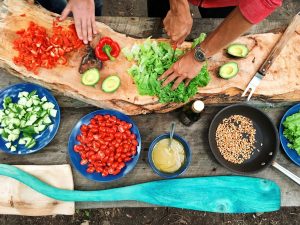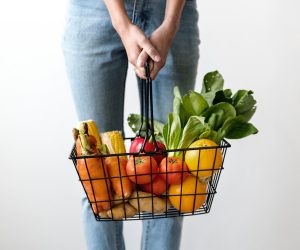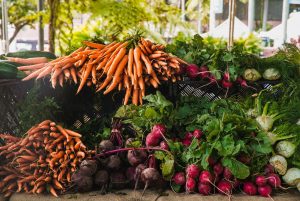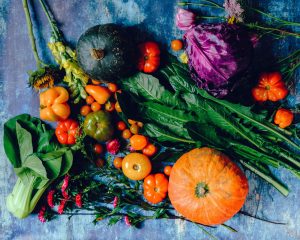Meal Plan for the Planet: It’s Good for You, Too
By Elaine Westcott, guest blogger

Photo credit: Maarten van den Heuvel via Pexels.com
Compared with driving a car, riding a bike is cheaper and has more benefits for your physiological and mental health, all with a negligible carbon footprint. It’s the same with our food: the least resource-intensive foods tend to be less expensive, more nourishing for our bodies, and of greater benefit to our local communities.
Regardless of our dietary preferences—from raw vegan to carnivore—we would all benefit from some tidying up in this department, for the health of both the natural world and ourselves.
In the spirit of gratitude, let’s first acknowledge some privileges that many of us share:
- Having the opportunity to learn how some foods are more nutritious than others
- Having the means to select, purchase, prepare, and enjoy our food
With these privileges comes the responsibility to make sustainable choices when purchasing food.
What is your impact on the food system?
Did you know that—per gram of protein—beef is the most resource-intensive protein source? According to the World Resources Institute, per gram of protein beef production requires 20 times more land, emits 20 times more greenhouse gas emissions, and has a water footprint six times larger than legumes such as soybeans, the highest source of vegetarian protein.
Given this statistic, the knee jerk reaction might be to become vegetarian ASAP. But what if the beef in question came from a local farmer whose cows live their entire lives grazing in grassy fields just 15 miles from your house, while that soy was grown in China before being packaged in non-recyclable plastic and shipped here in a climate-controlled cargo ship? Suddenly this simple comparison becomes less straightforward.
Given all the variables involved in producing our food, grocery shopping can be overwhelming for well-intentioned consumers. That’s why it’s so valuable to have a framework to help us make the best choices possible, even if our options are sometimes limited.
The concept of “SOUL Food” is a mainstay of nutrition philosophy at Bauman College in Berkeley. Deconstructed below, the “SOUL” acronym will help guide your food choices, and you’ll see how making environmentally conscious choices is also good for your health.

Photo credit: rawpixel.com via Pexels.com
Seasonal
Without the luxuries of greenhouses and international shipping, our ancestors ate seasonally by necessity. In today’s world we benefit from following seasonal cues in our dietary choices. By acknowledging our body’s guidance—whether that’s a craving for a warm, hearty bowl of stew to fight off the winter chill or seeking the crunch of veggies freshly harvested from our summer garden—we ensure a wide variety of nutrients in our diet.
Eating seasonally also lightens the load on your wallet (a seasonal glut of peaches means a drop in price) and your carbon footprint (no more blueberries from Chile or bell peppers from the Netherlands).
Organic
Labels and certifications aside, I think the essence of this word is: “grown with the same methods that our great-great-grandparents used.” The farmers of yesteryear practiced crop rotation, used actual manure for fertilizer, and wouldn’t dream of feeding cows anything but grass. To meet our growing demand, large-scale farming operations—whether organic or not—use chemicals in lieu of these traditional farming methods, sacrificing quality for quantity. For consumers, that means our grocery store-bought broccoli is much less nutrient-dense than that enjoyed by our ancestors.
Luckily for those who seek high-quality produce at non-exorbitant prices, there are many small, independent farms in the US and worldwide that follow organic practices but simply can’t afford the expense of certification. Just ask around at the next farmers market, and you will probably find some organically farmed produce at conventional prices.
To further underline the point that we need not go into debt in the pursuit of a 100% certified organic diet, the Environmental Working Group tests an array of fresh produce items and compiles the annual Dirty Dozen & Clean Fifteen list to help shoppers decide whether to opt for organic or go with conventional for particular items.

Photo credit: Wendy Wei via Pexels.com
Unprocessed
While processed foods are convenient, the main concerns with them are lower food quality and packaging waste. For example, fresh apples provide us with more vitamins than applesauce, and an apple doesn’t require packaging.
“But what about the 3 Rs: reduce, reuse, recycle?” you say. “The plastic clamshell that held my cherry tomatoes is recyclable!” Unfortunately, China is now accepting less of America’s recyclable waste, so that clamshell might end up in a landfill instead. Given the questionable future of recycling, let’s choose products with the least amount of packaging.
Avoiding packaged foods on principle also protects you from harmful substances. Highly processed fats are designed to be tasty, shelf-stable, and cheap for manufacturers, but they are full of free radicals that our bodies work hard to neutralize. Even hummus has a downside: studies find that some top brands of non-organic hummus contain significant levels of glyphosate, the main chemical of concern in the herbicide Roundup.
Local
Eating local is an easy way to lower your carbon footprint, with less mileage and refrigeration needed to transport your food all the way to your plate. Spending your dollars on local foods is a simple way to ensure that you’re eating seasonally while supporting food security in our communities.
If that’s not enough reason to shop local, optimizing the nutritional bang for your buck is easier with local produce: many studies have shown that fresher produce contains more antioxidants and vitamins compared to fruits and vegetables that have been sitting in the grocery display for a week. But even those still contain more nutrients than frozen or canned produce.
Sustainable Food Choices = Healthy You = Better Planet
The next time you’re at the grocery store or farmers market, the SOUL framework will guide you towards the best option, given what’s available to you that day. Now you know how to evaluate food options to make better choices in the future, both for your own nourishment and for the sake of the planet.

Credit: Ella Olsson via Pexels.com
Elaine is a WEN member who is currently a student in the Holistic Nutrition Consultant program at Bauman College in Berkeley. After completing the program in 2020, she will establish an individual coaching program to empower people to live vibrantly through a nourishing diet and positive lifestyle. Her previous experiences as a beekeeping researcher and environmental educator inform her passion for sustainable nutrition.
